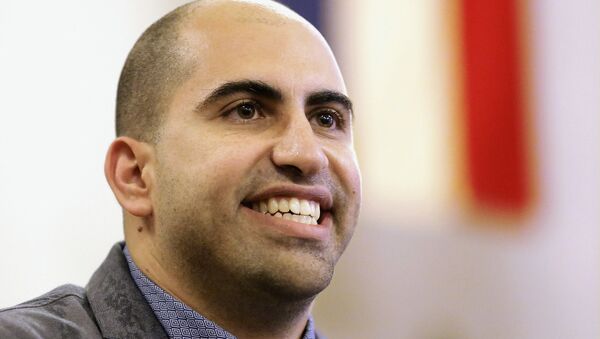Kilgore's guidelines, published online, were written after he spent a year on an ankle bracelet while on parole for his role in 1975 bank robbery that left a woman dead. Kilgore also interviewed other people who had been on the monitor, their family members, corrections officials and even the CEO of a monitoring company. The main takeaways from Kilgore's list of guidelines are that electronic monitoring "must be used instead of incarceration in prison or jail, not as an additional condition of parole, probation or pre-trial release."
"The [electronic monitoring] guidelines grew out of listening to people's' grievances when they were placed on electronic monitoring, be it pretrial release, be it parole, be it probation, be it immigration," Kilgore told Radio Sputnik's "By Any Means Necessary" recently.
"The main thing that came through [in] people's stories is the difficulty they had in actually being able to move outside their homes," Kilgore told hosts Eugene Puryear and Sean Blackmon.
In addition, Kilgore noted that electronic monitoring should only be implemented with a mindset that repudiates the "punitive philosophy" that has swept over the criminal justice system since the dramatic growth of mass incarceration in the US.
"Electronic monitoring typically comes with house arrest as a default position and you have to get specific permission from a probation or parole officer to leave the house, which is typically very difficult to obtain. That inhibits people from working and getting medical services. In actual fact, people are incarcerated in their homes instead of brick-and-mortar facilities," Kilgore told Radio Sputnik.
"One of the key factors of monitoring is that they are devices of control and surveillance. In Germany, the law says that all GPS tracking data must be deleted after two months. In the US, there are very few restrictions. I have seen electronic monitoring contracts stipulating that the data needs to be kept for years. In many cases, people haven't been convicted of a crime — but yet they are being tracked," Kilgore added.
Kilgore also noted that the tracking of bodies is not a new phenomenon, but rather a long-standing method used by the US government and corporations to deal with vulnerable populations.
"Although the technological dimension is new, the tracking of indigenous bodies came on with colonialism," Kilgore told Radio Sputnik.
"Tracking black bodies was a factor in slavery," he observed, specifically noting the use of human branding to identify an enslaved person by burning a symbol into their skin.
"The major owners of monitoring firms are some evil people," he said.
"The GEO Group owns the biggest electronic monitoring company in the US. These companies have ideas of growing their markets and revenues on the backs of poor people. Some people are paying $35 a day to be on an electronic monitor," Kilgore explained.
The GEO group, which was established in 1978, is the largest provider of monitoring technologies and related supervision services for parolees, probationers, pretrial defendants and individuals partaking in the immigration process in the US.
"The people who are pushing for decarceration on financial grounds are very comfortable with pushing and locking people back into their homes [with electronic monitoring equipment]. This agenda fits perfectly with the corporate agenda to increase the market for electronic monitoring devices. There are 4.5 million people [in the US] under some kind of carceral control. If I'm the CEO of the GEO Group, I'm seeing every one of those bodies as a place to put an electronic monitor," Kilgore added.
"We have to put ourselves in the seat of the CEO of these companies who dream of how they are going to expand their market. We have to think about how we are going to stop and reverse that."
Kilgore is also the project director of the "Challenging E-Carceration movement," which is also jointly hosted by the Center for Media Justice and the Urbana-Champaign Independent Media Center.
According to the campaign, electronic monitoring is converting poor communities into jails.
The "Challenging E-Carceration" website states that it will use "research, media, policy development and popular mobilization to limit the use of monitors and ensure that when monitors are used, the rights of those on monitors and their loved ones are respected."
"The purpose of the campaign is to inform people not to just settle with letting people out of jail," Kilgore told Radio Sputnik.
"Think about what happen when these people are released and they end up incarcerated in their homes in electronic monitoring, paying outrageous fees and subjected to all kinds of restrictions that don't enable them to get on with their lives. It is really important for people dealing with decarceration to think very carefully about the effects of electronic monitoring.".
"One of our tasks in this campaign is to reframe people's views on electronic monitoring. We want people to see that electronic monitoring is a way to shift the imprisonment site from brick-and-mortar buildings into poor and oppressed communities," Kilgore said.
In addition, according to Kilgore, there are race and class biases in which electronic monitoring is being used. There is a disproportionate application of electronic monitoring among youth, particularly black youth, people of color and immigrants.



